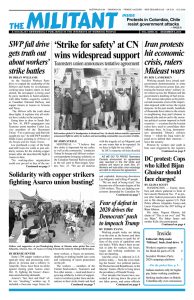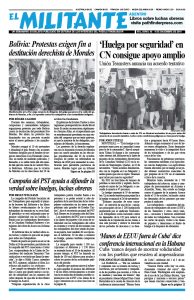December 12, 1994
The effects of Washington’s effort to starve the people of Iraq are prompting warnings of approaching famine and total economic collapse.
At a November 14 meeting, the United Nations Security Council, at the behest of the U.S. government, decided to maintain economic sanctions on Iraq. The sanctions, which were imposed in August 1990 at the opening of the Persian Gulf War, prevent Baghdad from selling oil to purchase food, medicine, and spare parts.
The [New York Times] editors warned that if the Clinton administration does not shift its policy, “the U.S. may face even more awkward problems from Iraq down the road and a breakdown of the allied unity on which containment of Baghdad ultimately depends.”
December 12, 1969
The stalemated nationwide strike of 147,000 General Electric workers, now in its sixth week, has brought into sharp relief some of the issues that make this strike a pivotal turning point for the future of organized labor.
The [Nixon] administration policy is to put the cost of the [Vietnam] war-created inflation on the workers.
The major December Moratorium action of the Bay Area Peace Action Council will be a rally, march and picket line Dec. 13 in support of striking General Electric workers.
United Electrical Workers Local 1412 has voted full support and endorsement to the action. Union members will speak at campus and other rallies to build the demonstration. The union is urging other locals and labor councils to back the action.
December 9, 1944
[President Franklin] Roosevelt’s preelection demagogy reached its height in his Chicago speech when he promised that the capitalist “free enterprise” system would provide 60 million jobs “after the war.” His supporters among the liberals and labor bureaucrats seized upon this counterfeit “promise” and are passing it around as good coin.
Roosevelt’s “equality of sacrifice” promise during the war, like his promise for jobs “after the war,” is a monstrous hoax.
When the struggle over the division of the national income is directed against the government, the methods of “pure and simple trade unionism” are hopelessly inadequate. Labor can maintain its standard of living only by waging an irreconcilable political struggle against the capitalist government.

